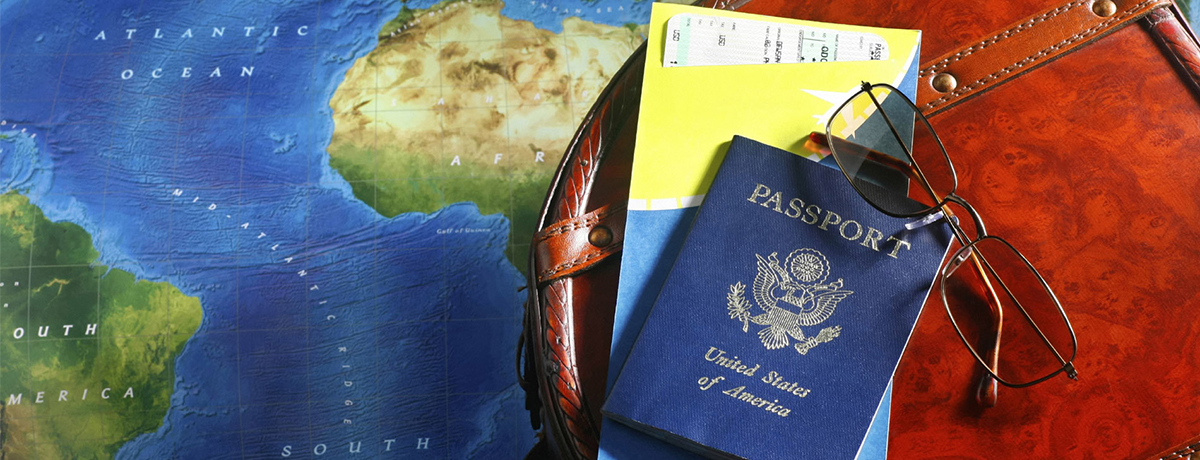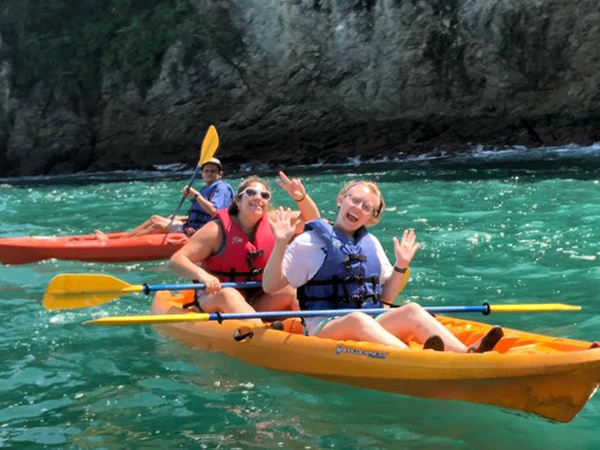- Academic Programs & Support
- WCU Global
- Study Abroad
- Parents and Families
- FAQ for Parents and Families
FAQ for Parents and Families

Why Study Abroad?

The opportunity to gain valuable intercultural communication skills, to explore other ways of life, to study academic subject from new viewpoints and to vastly improve language abilities may only come during your student’s university years. Choosing to study abroad could be one of the most important personal and/or academic decisions your student ever makes!
Among the most cited benefits of studying abroad are increased self-confidence, increased maturity, enhanced interest in academic study, improved problem-solving skills, reinforced commitment to foreign language study, enhanced understanding of one’s own cultural values and biases, new career direction, and improved employability.
Frequently Asked Questions
Your student can study in over 60 countries at hundreds of universities worldwide. Any major can study abroad.
A faculty-led travel course refers to a short-term study abroad program led by a Western Carolina University Faculty member in an international setting for anywhere between one to eight weeks. What is offered each year depends on our faculty choosing to create and offer a travel course. Thus, subjects tend to differ from one year to the next.
All other programs – including summer, semester and full year – are considered individual study abroad programs. Explore some of those options
The sooner your student begins planning, the better! Ideally, students should begin planning at least one year in advance and should have their applications ready to turn in at the beginning of the semester prior to their semester/year abroad. WCU’s deadlines differ depending on the type of program the student is selecting.
Deadlines for individual study abroad programs:
- For spring semester: October 1
- For summer, fall and full academic year: March 1
Deadlines for faculty-led programs:
- For fall break: June 1
- For winter and spring break: October 15
- For summer: January 15
Our basic eligibility requirements are 30 post-high school college credits (typically one year of college), a minimum 2.75 GPA and good academic standing. There may be additional admission requirements depending on the host university. Some may have language prerequisites or course subject requirements.
Students who want to apply as individual for a full summer or semester program should begin by exploring our website, studyabroad.wcu.edu, and contacting the Study Abroad Advisor to set up a meeting. He will begin by discussing program options and key factors including where s/he wants to study and for how long and financial considerations.
Applications for faculty-led travel courses are found on the IPS website. Students can apply to these programs directly. These are led by WCU professors and are usually 2-3 weeks long.
Studying abroad does not preclude a timely graduation. Students should consult their academic advisor and department head(s) in their study abroad plans from the very beginning. These individuals can help your student choose a program that is the best fit for their degree requirements.
Students must first meet our eligibility requirements (see above). Sophomore and junior years are typically the best times to study abroad. Summers are also an ideal time to go abroad.
Students may study abroad for as short as one to two weeks or for as long as three semesters.
No. While studying abroad is a great way to increase language skills, most host universities offer courses in English, even in non-English speaking countries.
Credits earned abroad will be accepted as transfer credit at WCU for students who have been accepted by the Study Abroad office and are studying with an approved study abroad program. Every student must also meet with his/her academic advisor and department head before departure to get his/her proposed courses evaluated and pre-approved. Courses abroad must be approved prior to departing to study abroad.
Credits earned abroad will transfer as satisfactory/unsatisfactory upon receipt of a student’s transcripts from the host institution abroad. Credits earned abroad for individual programs do not affect GPA.
Faculty-led courses are different. For these, students study with WCU faculty members on faculty-led travel courses and will receive credit as resident credit, which will be factored into their GPA.
Your student will earn credit that is transferrable back to WCU, but his/her GPA will remain unaffected. Exceptions include faculty-led travel courses (see above) which result in a letter grade, the same as any residential WCU course.
For individual study abroad programs, the academic environment will vary greatly depending
on their host university. Adjusting to cultural differences is an integral part of
the study abroad experience; academic expectations and coursework are no exception
to this. In many countries, for example, attendance will not be required, or class
grades will be based on one final exam rather than multiple assignments and tests
as in the U.S. It is important for students to remember that studying abroad places
them into a different cultural environment altogether, including in the classroom,
and even if there is only one exam at the end, studying abroad is not an extended
vacation. Students will benefit from their academic experience to the degree that
they invest themselves in it.
Faculty-led courses tend to be more concentrated and controlled, as students are led
and taught every day by a WCU professor.
Your student will be covered by a special travel health insurance plan that is mandatory for all students studying abroad. It costs approximately $1.45/day.
While some domestic plans may include some travel insurance, our policy is more comprehensive and includes emergency medical evacuation and repatriation of remains should a student die while abroad.
Our provider, GeoBlue (a subsidiary of BlueCross BlueShield), provides a network of medical facilities and doctors throughout the world. Their website includes a search engine to locate local medical services as well as travel safety and health information about most countries and major cities of the world.
This depends on location. Nearly all host universities offer dorms or shared apartments on or near campus. Some may also offer the opportunity to stay with a local host family (this is called a homestay). Each living arrangement has its own advantages and disadvantages.
Programs can range in cost from under $10,000 to over $20,000 and everything in between. Some of our programs are bilateral exchanges. In some exchanges, your student pays tuition and fees to WCU and room and board to the host university.
In others, your student pays tuition, fees, room and board to WCU and nearly nothing to the host institution. In a third category of programs – what we call third party programs – your student pays the majority of program costs to the program provider and minimal fees to WCU.
Yes. Financial aid can be applied to cover the majority of costs associated with any study abroad program.
Many parents naturally worry about the safety of their study abroad students. Unfortunately, a student’s safety cannot be 100% guaranteed anywhere, whether on WCU’s campus or anywhere else. However, certain steps can be taken to encourage a safe experience abroad.
Common sense is perhaps the most powerful weapon against safety threats while abroad.
For example, when walking at night or going to bars or clubs, it’s very important
that students go in pairs or groups. Alcohol laws differ in other countries – in some
countries, the legal age is lower than in the U.S. Thus, should a student choose to
drink s/he should practice moderation and drink responsibly. Avoiding obvious American
logos on clothing, refraining from talking/laughing in loud tones and maintaining
a low profile may help students blend in with the locals. Of course, speaking the
local language helps, too. The most important thing is to be alert and aware of one’s
surroundings at all times (which is another reason to avoid inebriation).
The U.S. Department of State website (travel.state.gov) includes up to date information about country-specific safety concerns, as well
as free traveler enrollment program that links your student to the U.S. embassy in
their host country. This is called the STEP program, found here: https://step.state.gov/step/. Your student has been strongly encouraged to enroll! Enrollment is free. Information
about traveler’s health and vaccinations can be found at the website for the Centers
for Disease Control and Prevention (https://www.cdc.gov/).
In case of emergencies, such as terrorist activity, political unrest or a natural disaster, your student’s first and most obvious resource is their host university’s international office and program staff. These individuals are native to the host country and will know and understand the local situation much better than your student, you as his/her parents, and the WCU international office.
Information of this kind is typically covered in the international student orientation your student will attend when s/he arrives at the host institution.
Local police are another important resource for aid and information. Naturally, the local U.S. Embassy is also an important resource. Your student was given information about the Embassy in their host country at their WCU study abroad pre-departure orientation. This information is also available at U.S. Department of State website (travel.state.gov). These sorts of unpredictable occurrences are one reason why enrollment in the STEP program is so important: https://step.state.gov/step/.
The frequency with which you contact your student will depend entirely on you and your student’s preferences. Facetime, Google Hangouts, WhatsApp, and Skype are common methods used to remained connected. Emails, Facebook, and even good old fashioned letters are also wonderful ways to stay in touch. You may wish to establish a time to contact your student each week.
An important aspect of the study abroad process is for students to find the balance between staying in touch with their loved ones at home, and fully investing in their experience abroad. The downside of today’s ease of communication is that it can be overused. Students (and parents) should utilize communication resources without allowing them to distract from the study abroad experience. We advise students to spend less than one hour a day using the internet and contacting people at home.
Adjusting to an unfamiliar culture and environment can lead to culture shock. The degree to which a student may experience culture shock will vary greatly and depends on myriad factors including personality, expectations about the abroad experience and the local social environment. Students may feel homesick or frustrated with the host country’s way of doing things when confronted with new and/or unexpected cultural/social/environmental differences. The majority of students adjust to the new cultural/social environment and thrive in their host country.
Parents and loved ones play an instrumental role in supporting a student who is experiencing culture shock. While suggesting that they come home immediately may be the natural first response, it is rarely the most helpful. Living in and pushing through the initial discomfort of their new and different environment is what can lead students to greater growth and understanding – both about themselves and about the new culture.
Culture shock can be experienced even when your student returns home. This is called reverse culture shock. They may initially be thrilled to be home, but later begin to feel sad, frustrated, withdrawn or “homesick” for their study abroad life. Parents and loved ones can support students during this process by listening to them – and listening some more. Asking questions, expressing interest in their stories, and taking time to listen are important. Remind them that what they are experiencing is normal and encourage them to find ways to remain connected to their new friends abroad. Returning home does not mean the end of the study abroad experience. Rather, it offers a great opportunity to integrate what one learned abroad into one’s life moving forward.